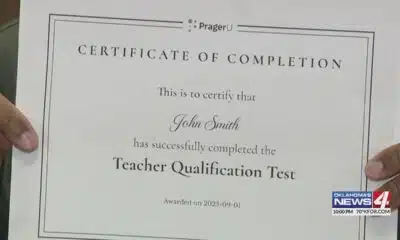Mississippi Today
On this day in 1896


MAY 18, 1896

The U.S. Supreme Court ruled 7-1 in Plessy v. Ferguson that racial segregation on railroads or similar public places was constitutional, forging the “separate but equal” doctrine that remained in place until 1954.
In his dissent that would foreshadow the ruling six decades later in Brown v. Board of Education, Justice John Marshall Harlan wrote that “separate but equal” rail cars were aimed at discriminating against Black Americans.
“In the view of the Constitution, in the eye of the law, there is in this country no superior, dominant, ruling class of citizens,” he wrote. “Our Constitution in color-blind and neither knows nor tolerates classes among citizens. In respect of civil rights, all citizens are equal before the law. The humblest is the peer of the most powerful. The law … takes no account of his surroundings or of his color when his civil rights as guaranteed by the supreme law of the land are involved.”
This article first appeared on Mississippi Today and is republished here under a Creative Commons license.
Did you miss our previous article…
https://www.biloxinewsevents.com/?p=359301
Mississippi Today
Northeast Mississippi speaker and worm farmer played key role in Coast recovery after Hurricane Katrina
The 20th anniversary of Hurricane Katrina slamming the Mississippi Gulf Coast has come and gone, rightfully garnering considerable media attention.
But still undercovered in the 20th anniversary saga of the storm that made landfall on Aug. 29, 2005, and caused unprecedented destruction is the role that a worm farmer from northeast Mississippi played in helping to revitalize the Coast.
House Speaker Billy McCoy, who died in 2019, was a worm farmer from the Prentiss, not Alcorn County, side of Rienzi — about as far away from the Gulf Coast as one could be in Mississippi.
McCoy grew other crops, but a staple of his operations was worm farming.
Early after the storm, the House speaker made a point of touring the Coast and visiting as many of the House members who lived on the Coast as he could to check on them.
But it was his action in the forum he loved the most — the Mississippi House — that is credited with being key to the Coast’s recovery.
Gov. Haley Barbour had called a special session about a month after the storm to take up multiple issues related to Katrina and the Gulf Coast’s survival and revitalization. The issue that received the most attention was Barbour’s proposal to remove the requirement that the casinos on the Coast be floating in the Mississippi Sound.
Katrina wreaked havoc on the floating casinos, and many operators said they would not rebuild if their casinos had to be in the Gulf waters. That was a crucial issue since the casinos were a major economic engine on the Coast, employing an estimated 30,000 in direct and indirect jobs.
It is difficult to fathom now the controversy surrounding Barbour’s proposal to allow the casinos to locate on land next to the water. Mississippi’s casino industry that was birthed with the early 1990s legislation was still new and controversial.
Various religious groups and others had continued to fight and oppose the casino industry and had made opposition to the expansion of gambling a priority.
Opposition to casinos and expansion of casinos was believed to be especially strong in rural areas, like those found in McCoy’s beloved northeast Mississippi. It was many of those rural areas that were the homes to rural white Democrats — now all but extinct in the Legislature but at the time still a force in the House.
So, voting in favor of casino expansion had the potential of being costly for what was McCoy’s base of power: the rural white Democrats.
Couple that with the fact that the Democratic-controlled House had been at odds with the Republican Barbour on multiple issues ranging from education funding to health care since Barbour was inaugurated in January 2004.
Barbour set records for the number of special sessions called by the governor. Those special sessions often were called to try to force the Democratic-controlled House to pass legislation it killed during the regular session.
The September 2005 special session was Barbour’s fifth of the year. For context, current Gov. Tate Reeves has called four in his nearly six years as governor.
There was little reason to expect McCoy to do Barbour’s bidding and lead the effort in the Legislature to pass his most controversial proposal: expanding casino gambling.
But when Barbour ally Lt. Gov. Amy Tuck, who presided over the Senate, refused to take up the controversial bill, Barbour was forced to turn to McCoy.
The former governor wrote about the circumstances in an essay he penned on the 20th anniversary of Hurricane Katrina for Mississippi Today Ideas.
“The Senate leadership, all Republicans, did not want to go first in passing the onshore casino law,” Barbour wrote. “So, I had to ask Speaker McCoy to allow it to come to the House floor and pass. He realized he should put the Coast and the state’s interests first. He did so, and the bill passed 61-53, with McCoy voting no.
“I will always admire Speaker McCoy, often my nemesis, for his integrity in putting the state first.”
Incidentally, former Rep. Bill Miles of Fulton, also in northeast Mississippi, was tasked by McCoy with counting, not whipping votes, to see if there was enough support in the House to pass the proposal. Not soon before the key vote, Miles said years later, he went to McCoy and told him there were more than enough votes to pass the legislation so he was voting no and broached the idea of the speaker also voting no.
It is likely that McCoy would have voted for the bill if his vote was needed.
Despite his no vote, the Biloxi Sun Herald newspaper ran a large photo of McCoy and hailed the Rienzi worm farmer as a hero for the Mississippi Gulf Coast.
This article first appeared on Mississippi Today and is republished here under a Creative Commons Attribution-NoDerivatives 4.0 International License.
The post Northeast Mississippi speaker and worm farmer played key role in Coast recovery after Hurricane Katrina appeared first on mississippitoday.org
Note: The following A.I. based commentary is not part of the original article, reproduced above, but is offered in the hopes that it will promote greater media literacy and critical thinking, by making any potential bias more visible to the reader –Staff Editor.
Political Bias Rating: Centrist
The article presents a factual and balanced account of the political dynamics surrounding Hurricane Katrina recovery efforts in Mississippi, focusing on bipartisan cooperation between Democratic and Republican leaders. It highlights the complexities of legislative decisions without overtly favoring one party or ideology, reflecting a neutral and informative tone typical of centrist reporting.
Mississippi Today
PSC moves toward placing Holly Springs utility into receivership
NEW ALBANY — After five hours in a courtroom where attendees struggled to find standing room, the Mississippi Public Service Commission voted to petition a judge to put the Holly Springs Utility Department into a receivership.
The PSC held the hearing Thursday about a half hour drive west from Holly Springs in New Albany, known as “The Fair and Friendly City.” Throughout the proceedings, members of the PSC, its consultants and Holly Springs officials emphasized there was no precedent for what was going on.
The city of Holly Springs has provided electricity through a contract with the Tennessee Valley Authority since 1935. It serves about 12,000 customers, most of whom live outside the city limits. While current and past city officials say the utility’s issues are a result of financial negligence over many years, the service failures hit a boiling point during a 2023 ice storm where customers saw outages that lasted roughly two weeks as well as power surges that broke their appliances.
Those living in the service area say those issues still occur periodically, in addition to infrequent and inaccurate billing.
“I moved to Marshall County in 2020 as a place for retirement for my husband and I, and it’s been a nightmare for five years,” customer Monica Wright told the PSC at Thursday’s hearing. “We’ve replaced every electronic device we own, every appliance, our well pump and our septic pumps. It has financially broke us.
“We’re living on prayers and promises, and we need your help today.”

Another customer, Roscoe Sitgger of Michigan City, said he recently received a series of monthly bills between $500 and $600.
Following a scathing July report by Silverpoint Consulting that found Holly Springs is “incapable” of running the utility, the three-member PSC voted unanimously on Thursday to determine the city isn’t providing “reasonably adequate service” to its customers. That language comes from a 2024 state bill that gave the commission authority to investigate the utility.
The bill gives a pathway for temporarily removing the utility’s control from the city, allowing the PSC to petition a chancery judge to place the department into the hands of a third party. The PSC voted unanimously to do just that.

Thursday’s hearing gave the commission its first chance to direct official questions at Holly Springs representatives. Newly elected Mayor Charles Terry, utility General Manager Wayne Jones and City Attorney John Keith Perry fielded an array of criticism from the PSC. In his rebuttal, Perry suggested that any solution — whether a receivership or selling the utility — would take time to implement, and requested 24 months for the city to make incremental improvements. Audience members shouted, “No!” as Perry spoke.
“We are in a crisis now,” responded Northern District Public Service Commissioner Chris Brown. “To try to turn the corner in incremental steps is going to be almost impossible.”

It’s unclear how much it would cost to fix the department’s long list of ailments. In 2023, TVPPA — a nonprofit that represents TVA’s local partners — estimated Holly Springs needs over $10 million just to restore its rights-of-way, and as much as $15 million to fix its substations. The department owes another $10 million in debt to TVA as well as its contractors, Brown said.
“The city is holding back the growth of the county,” said Republican Sen. Neil Whaley of Potts Camp, who passionately criticized the Holly Springs officials sitting a few feet away. “You’ve got to do better, you’ve got to realize you’re holding these people hostage, and it’s not right and it’s not fair… They are being represented by people who do not care about them as long as the bill is paid.”
In determining next steps, Silverpoint Principal Stephanie Vavro told the PSC it may be hard to find someone willing to serve as receiver for the utility department, make significant investments and then hand the keys back to the city. The 2024 bill, Vavro said, doesn’t limit options to a receivership, and alternatives could include condemning the utility or finding a nearby utility to buy the service area.

Answering questions from Central District Public Service Commissioner De’Keither Stamps, Vavro said it’s unclear how much the department is worth, adding an engineer’s study would be needed to come up with a number.
Terry, who reminded the PSC he’s only been Holly Springs’ mayor for just over 60 days, said there’s no way the city can afford the repair costs on its own. The city’s median income is about $47,000, roughly $8,000 less than the state’s as a whole.
This article first appeared on Mississippi Today and is republished here under a Creative Commons Attribution-NoDerivatives 4.0 International License.
The post PSC moves toward placing Holly Springs utility into receivership appeared first on mississippitoday.org
Note: The following A.I. based commentary is not part of the original article, reproduced above, but is offered in the hopes that it will promote greater media literacy and critical thinking, by making any potential bias more visible to the reader –Staff Editor.
Political Bias Rating: Centrist
This article presents a factual and balanced account of the situation involving the Holly Springs Utility Department and the Mississippi Public Service Commission. It includes perspectives from various stakeholders, such as city officials, residents, and state commissioners, without showing clear favoritism or ideological slant. The focus is on the practical challenges and financial issues faced by the utility, reflecting a neutral stance aimed at informing readers rather than advocating a particular political viewpoint.
Mississippi Today
Brandon residents want answers, guarantees about data center
Residents of Brandon have raised concerns about the environmental impact and safety of a data center planned for their city.
AVAIO Digital, a Connecticut-based company, announced Aug. 19 that it plans to build a data center in Rankin County. While some celebrated the $6-billion investment and the over $20 million in annual tax revenue it would bring, other residents worry about the data center’s water and power consumption and possible pollution. The 600,000-square-foot facility is expected to be completed by 2027.
‘People genuinely just want answers’
When Nathan Rester first saw the news about the data center, he was immediately concerned. Rester grew up in Brandon and now lives there with his wife and toddler just a few miles from where the data center will be built.
READ MORE: Mississippi Marketplace: Another data center on the way
Rester had followed reports about the air pollution that people in and around Memphis have reported, a result of XAI constructing gas turbines without pollution controls normally used for such turbines. He didn’t want to see what was happening in Memphis happen in Brandon.
His wife, Larkyn Collier, made calls but found the answers unsatisfying.
“ No one could really give a straight answer on how it was being built, what sort of precautions were being taken, whether or not there had been any sort of consideration for utility costs or pollutants or anything like that,” Rester said
In response, Collier and Rester started a petition on change.org that now has over 430 signatures. The petition asks Rankin County leaders to guarantee the data center will not cause such problems. So far they have not received any communication from Rankin or Brandon government officials.
Rester is not completely opposed to the data center being built but he wants the government to guarantee it won’t bring utility bill hikes or pollution.
“ People genuinely just want answers and transparency here. And they want safeguards in place,” Rester said.
The AI boom comes to Mississippi
At their most basic level, data centers store computing equipment. They have been around since the 1940s and power things such as cloud storage. But with the boom in artificial intelligence investment, companies are rapidly constructing data centers across the globe.
The investment bank UBS estimates $375 billion will be spent globally on artificial intelligence in 2025. While this investment has fueled economic and technological growth, data centers have faced skepticism in the communities where they’re built, largely due to the amounts of energy and water they consume and possible pollution they emit.
Mississippi has two large-scale data center projects underway – Compass Datacenters in Meridian and Amazon in Madison County. Including the AVAIO data center, the three will add up to over $26 billion in new capital investment, an unprecedented amount for the state.
Cities and states are embracing data centers because of the potential economic growth, new taxes and innovation they bring.
“This investment is poised to create a lasting, positive impact on the city and the wider region,” Brandon Mayor Butch Lee said in a statement to Mississippi Today. “The project represents a major step forward for Brandon, bringing high-tech jobs and economic growth that will resonate throughout Rankin County and beyond.”
When the property is on the tax rolls and fully up and running, the ad valorem tax will bring in an estimated $23 million in new revenue according to Rankin First, the county’s economic development group. Most of it will go to the local school district.
“ These are not here today. And if we didn’t win this project, we would never see those,” said Garrett Wright, executive director of Rankin First, about tax revenue from the data center.
Rankin First, similar to many economic development groups, is not part of county government and is hired to attract new investment and cultivate existing businesses. It owns the land that the data center will be built on, which has been vacant for around 20 years.
AVAIO is eligible for the state’s data center tax incentive and fee in lieu of property tax. Companies pay a negotiated fee for a set period of time instead of the full property tax. The incentive is designed to encourage economic development. It requires sign off from the county board of supervisors, municipal authorities and Mississippi Development Authority, the state’s economic development agency.
It’s estimated AVAIO will create 60 direct jobs and the Amazon data center 300-400 direct jobs. While data centers create relatively few permanent, direct jobs they create additional jobs in the community. A McKinsey and Company report found that for every direct data center job, approximately 3.5 more jobs are created in the community.
Some residents on social media have wondered whether the data center will negatively impact traffic. Traffic and grade separation of the rail lines have been key conversations as Rankin County has grown. Rankin First acknowledged that AVAIO’s presence will increase traffic but they see it as an opportunity to push for long needed infrastructure improvements.
Rankin First and Brandon have been working with AVAIO for two years and says the company is coming to Brandon, in part, because of the thriving community.
“ The company wants to be a community partner. We see that they’re going to get involved with the local community,” said Regina Todd, assistant director of Rankin First.
Brandon residents want answers
Bailey Henry has lived in Brandon for over a decade. She said that when she read about the new data center on social media, she became concerned.
“ I’ve lived in Mississippi the majority of my life and I was raised to leave things better than you found it,” Henry said. “ And I just don’t think that Mississippi is going to be better off from this.”
Henry is worried about the pressure the data centers will put on the city’s infrastructure, pollution and power demands.
She describes the announcement as “ brief and nonchalant as all the explanations have been. From politicians to people who work for Entergy. It has just been, ‘This is what it is. It’s going to be great. Don’t ask any questions.’”
Henry has made calls to and left voicemails with multiple government offices and has not heard back from any of them.
She’s skeptical, but she hopes she’s wrong.
Brandon concerns echo nationwide conversation
The biggest concerns from residents nationwide over data centers has been potential pollution and increases in utility bills. Across the country, there are stories about data centers driving up energy rates, worsening water shortages, polluting the air and creating a constant noise.
AI data centers demand massive amounts of electricity and run constantly. The average AI data center uses as much electricity as 100,000 households, according to a report from the International Energy Agency.
Another concern is water usage. Data centers need to stay at a specific temperature, and water is one of the most efficient ways to cool the servers. The IEA report found that the average AI data center needs about 528,000 gallons of water every day. For communities that already have water concerns, data centers can exacerbate the problems.
Some communities have blamed the increased demand from data centers for rising electricity bills. While part of these costs may be due to general inflation or paying for infrastructure upgrades, some states are trying to monitor or regulate how households are affected.
A data center’s impact can vary based on the design of the center. But by their very nature they consume a lot of power.
“ AI chips are very power hungry. We’re building a lot of computing capacity, so we need to power all of this,” said Ahmed Saeed, a computer science assistant professor at Georgia Tech.
AVAIO promised “sustainable design,” including rainwater collection and solar panels that would “minimize power demands.” But it’s still unclear what, if any, impact the new data center will have on Rankin County residents.
“ Having clarity on the impact of data centers within the community where they’re building is important,” Saeed said. Saeed believes data centers are here to stay and are key for innovation. But he also thinks there’s a need for more government regulation.
“ They’re not necessarily a negative thing, but on the flip side, in order to make sure that they’re net positive it’s hard to ensure that without some regulation,” Saeed said.
Rankin County’s administrator declined to comment for this story. AVAIO and Brandon Water did not respond to requests for comment.
This article first appeared on Mississippi Today and is republished here under a Creative Commons Attribution-NoDerivatives 4.0 International License.
The post Brandon residents want answers, guarantees about data center appeared first on mississippitoday.org
Note: The following A.I. based commentary is not part of the original article, reproduced above, but is offered in the hopes that it will promote greater media literacy and critical thinking, by making any potential bias more visible to the reader –Staff Editor.
Political Bias Rating: Center-Left
This article presents a balanced view but leans slightly center-left by emphasizing environmental concerns, community impact, and the need for government transparency and regulation regarding the data center project. It highlights residents’ worries about pollution, utility costs, and infrastructure strain, while also acknowledging economic benefits and job creation. The focus on environmental and social accountability alongside economic development aligns with a center-left perspective that values both growth and sustainability.
-
Mississippi Today6 days ago
Trump proposed getting rid of FEMA, but his review council seems focused on reforming the agency
-
News from the South - Missouri News Feed7 days ago
Missouri joins dozens of states in eliminating ‘luxury’ tax on diapers, period products
-
News from the South - Tennessee News Feed6 days ago
Tennessee ranks near the top for ICE arrests
-
News from the South - Texas News Feed4 days ago
Texas high school football scores for Thursday, Sept. 4
-
News from the South - Oklahoma News Feed6 days ago
Test taker finds it's impossible to fail 'woke' teacher assessment
-
News from the South - Arkansas News Feed6 days ago
Every fall there’s a government shutdown warning. This time it could happen.
-
Mississippi Today5 days ago
Brandon residents want answers, guarantees about data center
-
Our Mississippi Home6 days ago
Pre-Fall Fun in Mississippi | Our Mississippi Home

















































